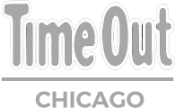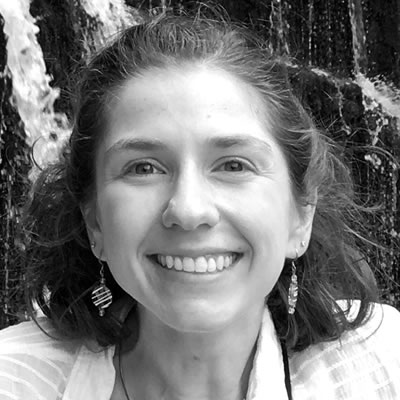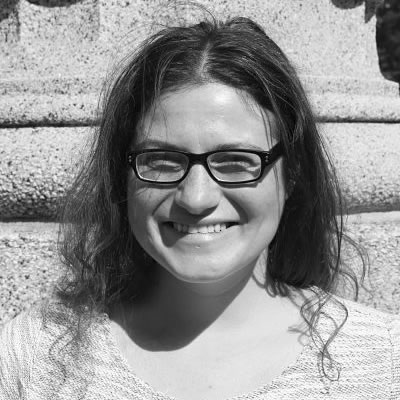The 37th annual Chicago Marathon is coming up this Sunday, October 12th and a good friend of mine, Rebecca Rosenberg, is taking the challenge to run in memory of her good friend Angie who died this past year of cancer. She is supporting a fantastic charity called Imerman Anglels, a non-profit whose mission is to provide cancer fighters with one-on-one support from those who have gone through the same so that no one has to fight cancer alone. It’s a pretty great cause so in addition to donating, I thought I’d share the research I did on the history of the Chicago Marathon.
History of the Chicago Marathon
Although known now as the Bank of America Chicago Marathon, back when it started in 1977, the original name for the race was the Mayor Daley Marathon. On September 25th of that year, 4,200 runners came out to participate. Now the race has up to 45,000 runners! That’s a lot of people in downtown Chicago, not to mention all the spectators that come out to support the runners. It reminds me of the video we share on our Loop Interior Architecture Walking Tour of Chicago in 1897. Busy, congested, absolutely chaotic, and completely alive.
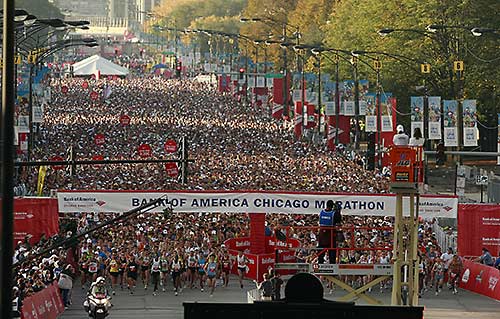
The Chicago Marathon as we know it today may have began in 1977, but this was not the first marathon in Chicago. The first was actually all the way back in September of 1905. The course began in Evanston and ended in Washington Park and drew world athletes and plenty of spectators, some of which paid for seats at the finish line. The difficulty of the late 1920s brought the race to an end and it wasn’t until the 1960s that interest in the sport bubbled back up. The windy city established the Chicago Marathon as the second big city run, next to the New York City Marathon, which was established only a few years earlier in 1976. By the 1980s, Chicago was one of the big four city marathons bringing worldwide interest back to the event.
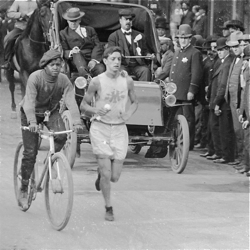
A Record-Setting Race
In looking into why people would want to participate in such a grueling activity, I found that the Chicago Marathon draws so many runners for some of the same reasons Chicago drew so many people after the Great Chicago Fire of 1871. The pursuit of personal records and world records. After the fire we had architects from all over the world come to re-imagine this great city and Chicago is now known as the home for records in architecture such as the first skyscraper or at one point the tallest building in the world. And just as the destroyed city created a new canvas for great architecture, the flatness of the Chicago Marathon course facilitated record breaking achievements.
Chicago has been home to four world record runs and the record for the 26.2 mile Chicago course is a mere 2 hours, 3 minutes and 45 seconds. This was set in 2013 by Dennis Kimetto, a runner from Kenya who also holds the world record for a marathon run set in 2014 in Berlin. So that means Kimetto’s average time per mile for Chicago was only 4.7 minutes!
Open to All
In addition to setting records for those that have won the marathon over the years, the race draws many more than those who have a chance at winning. The Chicago Marathon is known as “the World’s Marathon” because you do not have to a qualifying time to participate. It’s open to anyone.
That first race back in 1977 drew people of all ages from a 12-year-old kid to a 74-year-old man. Although Ben Mostow, 74, did not intend to win the race that year, he did hope to be in the Guinness Book of World Records for the fastest marathon time for a 74-year-old man. He had already been a long time walker having walked all the way from Skokie, IL to Racine, WI, (about a 60-mile hike) and he had simply always been a walker. He had no doubts that he would finish the race as his own slogan was “rain, shine, snow or sleet, Mostow’s always on his feet.”
In fact, it seems to me that Chicago Marathon is less about winning and more about the pride of finishing. Whether 12 or 74, a marathon runner will spend an enormous amount of time training, running at least four times a week and around 300 miles a month, just to build up the endurance to finish the race. It has made me realize that although I think marathon runners are a little crazy, they are possibly the most dedicated and determined individuals in the world. So few can say they have run a marathon and reading the stories of those who have pushed themselves to this achievement, I have so much more pride and admiration for my friend.
Here’s to you, Chicago Marathon runners!
–Jenn Harrman, Tour Guide


